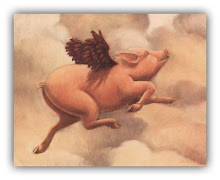 Here's another view of my 14-LAYER CAKE from Deanna's shower. I couldn't come up with a fun decorating idea for the cake... Until I remembered reading an article about making CHOCOLATE BUTTERFLIES. I don't remember in which magazine I read about this project, but it was years ago. I knew I had to make the butterflies, but without directions, I'd just have to "wing it". (That pun deserves, at least, a snicker!)
Here's another view of my 14-LAYER CAKE from Deanna's shower. I couldn't come up with a fun decorating idea for the cake... Until I remembered reading an article about making CHOCOLATE BUTTERFLIES. I don't remember in which magazine I read about this project, but it was years ago. I knew I had to make the butterflies, but without directions, I'd just have to "wing it". (That pun deserves, at least, a snicker!) Step 1: Melt a square or two of chocolate "bark" in the microwave. Stir until smooth.
Step 1: Melt a square or two of chocolate "bark" in the microwave. Stir until smooth. Step 2: Cover your butterly pattern with waxed paper and trace your pattern with the melted chocolate. You can pipe it on, use a paint brush, or use the end of a skewer or chopstick. If you don't like the result, toss out the wax paper and start again :-) DO NOT TRACE THE BODY! Your end result should be two separate wings.
 Step 3: Melt a couple of squares of white "bark". Make sure your outline has hardened, then fill in your white areas. Next, tint the remaining white bark with "paste" food coloring. (Do not use liquid food color. It will make the bark hard and grainy.) Fill in the remaining areas on your wings and allow to harden. It only takes a few minutes.
Step 3: Melt a couple of squares of white "bark". Make sure your outline has hardened, then fill in your white areas. Next, tint the remaining white bark with "paste" food coloring. (Do not use liquid food color. It will make the bark hard and grainy.) Fill in the remaining areas on your wings and allow to harden. It only takes a few minutes. Step 4: Drape a sheet of waxed paper over two "wing supports" (I used tongs for the biggest butterfly and chopsticks for the smaller ones). Lay your wings on the supports so they form a "V". Pipe on your butterly body with re-melted chocolate bark. This will connect your wings. Let dry.
Step 4: Drape a sheet of waxed paper over two "wing supports" (I used tongs for the biggest butterfly and chopsticks for the smaller ones). Lay your wings on the supports so they form a "V". Pipe on your butterly body with re-melted chocolate bark. This will connect your wings. Let dry. Step 5: Pipe out several sets of antenae. Pipe heads onto your butterfly bodies while your antenea harden.
Step 5: Pipe out several sets of antenae. Pipe heads onto your butterfly bodies while your antenea harden. Step 6: Lay a chopstick (or other support) near the butterfly head, add a drop or two of chocolate bark, and position your antenae. Once the butterflies harden, they are ready to use to decorate any of your edible goodies.
Step 6: Lay a chopstick (or other support) near the butterfly head, add a drop or two of chocolate bark, and position your antenae. Once the butterflies harden, they are ready to use to decorate any of your edible goodies.'
For my next butterflies, I am going to try filling in the wings with a solid color (blue might be pretty!), dripping in dots of chocolate, and then cutting the dark color into the blue for a "marbled" effect. I'll let you know how it goes :-)
'
Enjoy!
'
Hugs and blessings~
~~~Anne

 So... We had Deanna's Baby Shower at the Kumon Center on Saturday. I was very happy to finally get the chance to meet her beautiful mother, Loretta, and her sister-in-law, Sonya. I think they both had a great time getting to know Deanna's "Kumon family"!
So... We had Deanna's Baby Shower at the Kumon Center on Saturday. I was very happy to finally get the chance to meet her beautiful mother, Loretta, and her sister-in-law, Sonya. I think they both had a great time getting to know Deanna's "Kumon family"! Even Hailey had a great time! (But I think we had an even better time watching and listening to her. She's two years old, and smart as a whip!)
Even Hailey had a great time! (But I think we had an even better time watching and listening to her. She's two years old, and smart as a whip!) Woo hoo! Both of my cakes came out beautifully, and I'm soooo relieved. Above is my FLOURLESS BITTERSWEET MOCHA CAKE. I'll post the recipe and the tutorial later this week.
Woo hoo! Both of my cakes came out beautifully, and I'm soooo relieved. Above is my FLOURLESS BITTERSWEET MOCHA CAKE. I'll post the recipe and the tutorial later this week. This is my 14-LAYER CAKE. I'm very proud of this one! I'll post pictures of the entire baking process later (including making the chocolate butterflies), but I got both the tutorial and the recipe from the absolutely amazing Bakerella. Her pictures are beautiful and her tutorial is easy to understand.
This is my 14-LAYER CAKE. I'm very proud of this one! I'll post pictures of the entire baking process later (including making the chocolate butterflies), but I got both the tutorial and the recipe from the absolutely amazing Bakerella. Her pictures are beautiful and her tutorial is easy to understand. 

 Step 2: Assemble your materials. Lifesavers will have to be unwrapped :-)
Step 2: Assemble your materials. Lifesavers will have to be unwrapped :-) Step 3: Put a bit of Royal Icing "glue" on the edge of one Lifesaver. (I put my icing in a bowl and used a chopstick as my "gluing tool".)
Step 3: Put a bit of Royal Icing "glue" on the edge of one Lifesaver. (I put my icing in a bowl and used a chopstick as my "gluing tool".) Place the glued Lifesaver on top of another Lifesaver as shown above. Hold it for just a moment and it will stick. Royal icing is tough stuff! Place your glued Lifesavers on a cookie sheet and allow to dry for about 10-15 minutes.
Place the glued Lifesaver on top of another Lifesaver as shown above. Hold it for just a moment and it will stick. Royal icing is tough stuff! Place your glued Lifesavers on a cookie sheet and allow to dry for about 10-15 minutes. Step 4: Put a drop of glue in the center hole and attach your Jelly Belly. I lined mine up along the edge of my cookie sheet in a "standing position". Allow to dry thoroughly before wrapping (15-30 minutes).
Step 4: Put a drop of glue in the center hole and attach your Jelly Belly. I lined mine up along the edge of my cookie sheet in a "standing position". Allow to dry thoroughly before wrapping (15-30 minutes). There you have it! A simple and quick project, sure to delight a mother-to-be and all of her baby shower guests.
There you have it! A simple and quick project, sure to delight a mother-to-be and all of her baby shower guests. 




 10. Using a sharp knife, cut your sushi "log" into 1/2" slices. Serve flat on a plate with wasabi and soy sauce for dipping.
10. Using a sharp knife, cut your sushi "log" into 1/2" slices. Serve flat on a plate with wasabi and soy sauce for dipping.






